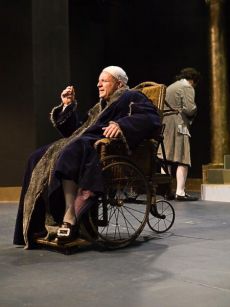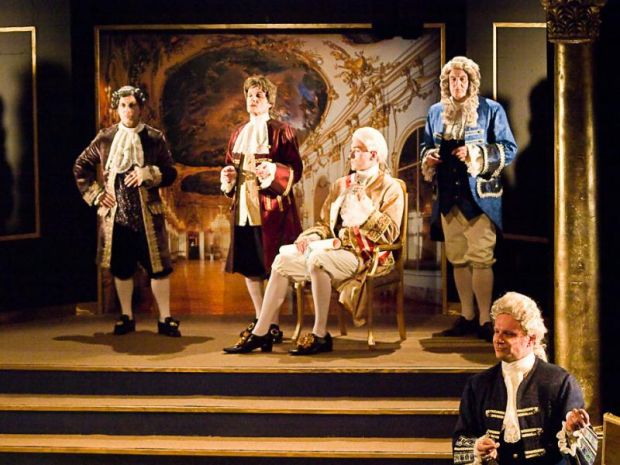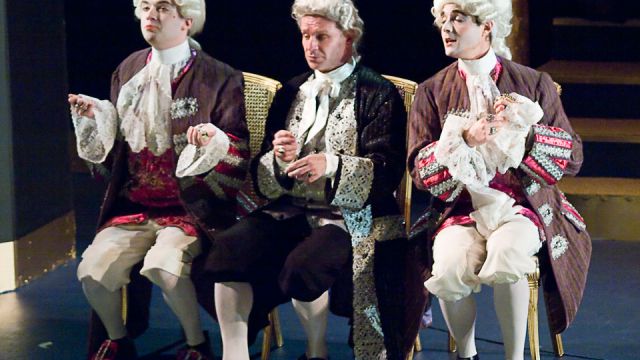Amadeus
It could be said that Peter Shaffer is one of the 20th Century’s greatest playwrights and Amadeus is already a “classic” play. Certainly the role of Salieri is one of the showiest and most compelling roles since Shakespeare’s time, and it’s also one of the most gruelling.
Shaffer’s play, based on a rumour started by Pushkin (that court composer Salieri had murdered Mozart because he was jealous of his talent) goes far beyond the story. It explores the concept of “God-given talent” and the nature of those to whom it is entrusted. It questions the sad but true fact that great talent exists beyond the individual and is therefore at the mercy of mediocrity, the actions of which are driven by lesser men. It is a stunning but difficult piece.

When a community theatre company, even one of such quality as HTC, decides to take on this staggering “star” vehicle, you might expect to “approach with caution”. Not the case when the “star” is an actor of the calibre of Angelo De Cata. But this isn’t a one-man show. This is a beautifully staged production of the highest quality and director Bruce Akers has endowed it with his usual quest for excellence, with overall astonishing results.
The set (by George Tranter) is simple but truly effective, with three steps up to an upstage “tableaux” area. Downstage is dressed minimally with an effective prop spinnet and other “antiques” when, and as, needed. The lighting design by Deryk Hartwick is everything one could wish for, and the same can be said George Bissett’s sound design. Both are beautifully executed by the technicians. The costumes and props are mind bogglingly lavish and totally appropriate. It’s a visual feast.
And so to performances. It isn’t often one can say there isn’t a single weak performance in the cast – even amongst the non-speaking roles and ensemble. Mark Briggs is an excellent Mozart, though he has perhaps too much physical stature. It’s hard to get one’s head around the fact that his very first role on stage was only 3 years ago. He’s clearly a natural and embodies the childish (and childlike) crudity of Amadeus as Shaffer defines him. It’s not by chance that his performance is raised by several notches when he is interacting with Salieri. Cat Jardine (Constanze) plays Mozart’s wife with an east London accent and it really works in conveying the girl from the gutter. There’s a warm connection between her and Briggs which is natural and convincing.

Paul Kennedy is truly impressive as Count Franz Orsini Rosenberg. He has great finesse and a stage presence that speaks volumes for his training and experience….a thoroughly enjoyable performance. Paul Schmidt (Emperor Joseph II), Don Nicholson (Count Von Strack) and Jim Thomson (Baron Van Swieten) all add their talents, which are far beyond mere competence, to the mix, and the two Vinticellos – Pedro Ramos and Blake Stringer – are an absolute delight whenever they take the stage. The smaller roles are also played with great commitment.
And then there’s Salieri…and I’ll disclose that I have reviewed the actor in four plays and met him on three occasions personally. That is all. I am not his agent, manager, mother, publicist, or best buddy, simply an admirer. But I can say without question – and quite objectively – that, for me, Angelo de Cata is simply one of the finest actors I have seen on any stage at any time …and I have seen – live on stage – Gielgud, Olivier, Finney, Courtney, Mckellen, Neville and other greats.

What makes his Salieri so brilliant? Well, for starters, he is of Italian heritage and so is completely at home with the lines in Italian, and with the ethos of Latin men. It’s natural to him. Where F Murray Abrahams and Ian McKellen (I never saw Paul Scofield unfortunately) gave us rather cold, calculating men bent on destruction out of a necessity for survival, de Cata is Fire and Ice. The foppish well-mannered Court musician plays the sardonic two-faced patron to perfection. There is the Ice. But then comes the Fire as he explodes in a blazing inferno of passion which literally knocks you back in your seat. He doesn’t chide God in a bitter manner – he hates him, would kill him, rages at him, and he sticks a knife in your gut as you watch, not daring to breathe. He isn’t wracked with guilt as an old man – he is engulfed in self-loathing that is palpable; as is his self-awareness of his own mediocrity. He is in so much pain that you want to cry for him. When he cries out “I am the saint of mediocrity” it is both a confession and a boast. It’s an excessive performance….but perfect. The hand gestures are not those of a court gentleman but of a fiery Italian who has climbed to heights beyond his status and must play the genteel game. Sometimes, with outflung hands, it seems as though he will pick up the stage and crumple it to dust, there is so much emotion screaming to get out. If I have one teensy criticism…and it is churlish...it is that although he ages physically as the old Salieri the walk, the stature, the expressions) the hands remain young and powerful, but perhaps that is his intent. He is completely absorbed and totally absorbing.
I regret not seeing de Cata play The Cowardly Lion in Wizard of Oz, for I have seen the gentle vulnerable and heart-breaking side of his work in Kiss Of The Spider Woman; but I am grateful I have seen the power of his Salieri. And added to all the other elements, this is a marvellous night of theatre which cannot possibly fail to engage you.
Coral Drouyn
Photographer: David Belton


Subscribe to our E-Newsletter, buy our latest print edition or find a Performing Arts book at Book Nook.

